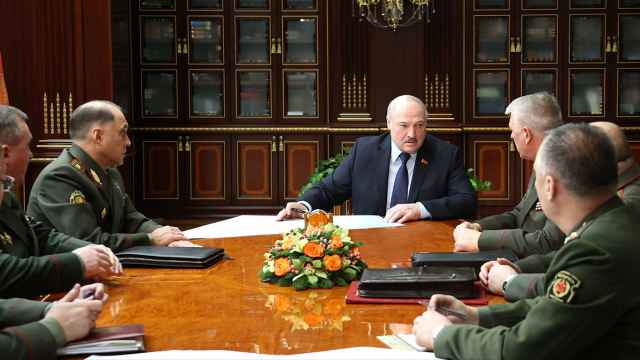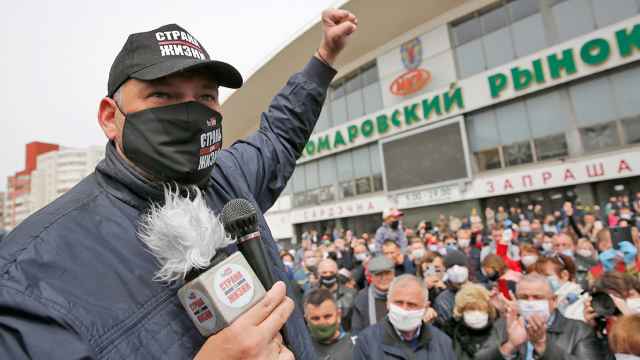The Russian energy ministry says clean oil is flowing in the Druzhba pipeline, which was shut down last week because it was conveying contaminated crude to European clients. But neighboring Belarus insistsit will take “months of hard work” to restore the flow. That reveals a political aspect to the contamination, which last week helped drive Brent crude prices above $75 a barrel.
Belarus made public the problem with Russian oil in the Druzhba (“Friendship” in Russian) on April 19, saying there was an abnormally high concentration of organic chlorides in the crude. The chemicals are used to increase the yield of old, nearly exhausted oil wells; Russia lifted a ban on their use in 2012. During refining, the chemicals tend to convert into hydrogen chloride and then, on contact with water, into a hydrochloric acid solution, which corrodes the refining equipment.
Contamination happens sporadically, and it’s possible that the Russian oil flowing through the Druzhba — a pipeline built in Soviet times to supply the Communist empire’s European satellites — has contained more organic chlorides than normal for quite some time. Russian oil producers or the pipeline monopoly, Transneft, haven’t been testing for them systematically enough.
On April 10, Russia’s sanitary authority banned the import of apples and pears from Belarus. It suspected that the fruit was really coming from the European Union and that Belarus was helping Europeans beat the Russian food embargo, introduced in 2014 in response to the EU’s Ukraine-related sanctions. This was clearly part of a Russian pressure campaign for a closer union between the two dictatorships, which could provide an option for Russian President Vladimir Putin retain power in 2024 by heading up a hypothetical union state.
The campaign is multipronged. Apart from increasingly frequent trade restrictions, it includes loan delays and squeezing Belarus by cutting off its ability to sell the Russian oil it buys at reduced prices.
A merger with Russia is unpopular in Belarus, and President Alexander Lukashenko, who has been running the country since 1994, has his own reasons to resist it. So he’s not above playing some hardball in response.
On April 11, the day after the apple ban, Lukashenko said the Belarussian part of the Druzhba pipeline should long have been closed for repairs. “We didn’t do it because we understood that it would hurt the Russian Federation,” Lukashenko told a meeting of top officials. But now, he continued, “all the good we do the Russian Federation is paid back with evil.”
A week later, the tainted oil was found, the Polish and Ukrainian pipeline systems stopped accepting the Russian crude, and the Druzhba was shut down. This was the best possible way for Belarus to launch its counteroffensive. The chlorides were actually there, and if Russia had insisted the oil was fine, it would have destroyed trust with European customers — something it avoids at all costs. So Russia went into all kinds of contortions to prove that the contamination was a one-off.
Transneft has announced that it found the source of the contaminants — a specific part of the pipeline. Putin has called for an investigation, and Russian prosecutors are looking into the possibility of deliberate sabotage. The Russian energy ministry, meanwhile, has assured customers that the supply of normal quality crude would resume as soon as possible, and indeed, the Belarussian arm of Transneft plans to start pumping it to Europe by Thursday.
It has warned, however, that by May 10, the pipeline would carry less than two-thirds of its average crude volume and that getting back to full capacity would take months. According to the company, some 36 million barrels of tainted crude are still locked in Belarussian, Ukrainian and Polish pipelines. It’s unlikely that the short-lived price increase went far enough to compensate Russian oil companies, especially Transneft, for the potential losses.
Lukashenko is not about to throw away his trump card: He can use Druzhba repairs and shutdowns, as well as compensation demands, in negotiations with Russia for months.
Putin has a knack for alienating neighbors and allies by demanding too much from them. Now that even usually submissive Belarus is snapping back and hitting oil-dependent Russia where it hurts, he must wonder whether he has any friends left in Russia’s immediate post-Soviet neighborhood — and consider changing his strategy to a more accommodating one. Georgia and Ukraine would especially appreciate that.
This article was originally published in Bloomberg Content.
A Message from The Moscow Times:
Dear readers,
We are facing unprecedented challenges. Russia's Prosecutor General's Office has designated The Moscow Times as an "undesirable" organization, criminalizing our work and putting our staff at risk of prosecution. This follows our earlier unjust labeling as a "foreign agent."
These actions are direct attempts to silence independent journalism in Russia. The authorities claim our work "discredits the decisions of the Russian leadership." We see things differently: we strive to provide accurate, unbiased reporting on Russia.
We, the journalists of The Moscow Times, refuse to be silenced. But to continue our work, we need your help.
Your support, no matter how small, makes a world of difference. If you can, please support us monthly starting from just $2. It's quick to set up, and every contribution makes a significant impact.
By supporting The Moscow Times, you're defending open, independent journalism in the face of repression. Thank you for standing with us.
Remind me later.








